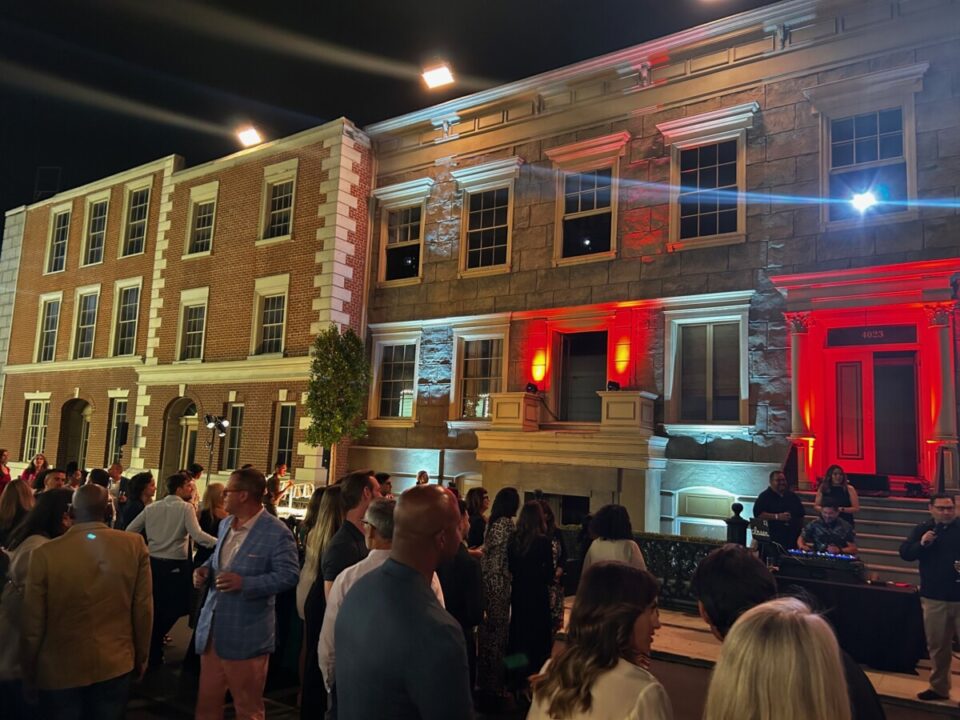Recruiting Continues Despite 100-Person Layoff
Rubén Rosario, ‘OG Street Reporter,’ Dies at 70
Biden Takes No Questions From Black Journalists
Homepage photo: Members of the National Association of Hispanic Journalists celebrated the first day of their annual conference at a lavish cocktail party hosted by CNN.
Support Journal-ismsNew! Facebook fundraiser for Journal-isms Inc.
Donations are tax-deductible.
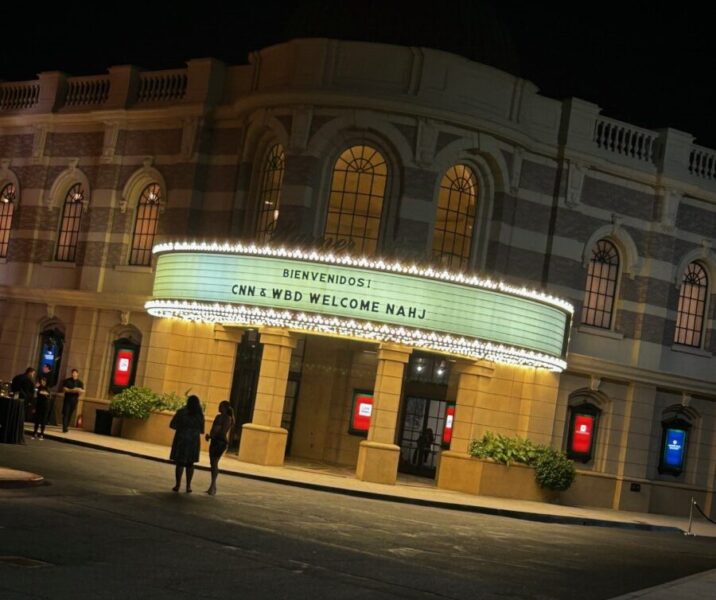
Recruiting Continues Despite 100-Person Layoff
CNN’s race and equality team, announced with fanfare in 2020 in the wake of the George Floyd murder, is being disbanded, its members integrated into the network’s general coverage.
The change takes place amid larger developments: The network announced plans Wednesday to cut about 100 jobs, launch a subscription product and lessen CNN’s dependence on its cable-TV channel.
“CNN’s domestic race and equality team will be integrated in the News Hub structure to ensure that coverage around race and equality is woven into our day-to-day reporting and storytelling in the US and around the world,” a spokesperson told Journal-isms. “We are making sure coverage of this vital subject is woven into all our reporting, and not exclusively reserved for one group of reporters.”
It was never CNN’s intention for the race and equality team to do all such reporting, according to the 2020 announcement from Jeff Zucker, then chairman of WarnerMedia News and Sports.
“This team is not a silo for all race coverage, but it is a center and a beacon to enable us to do all the work there is to do in the most timely, relevant way we can for audiences across all platforms,” Zucker wrote then. “This enhanced team and structure will provide a more effective ‘air traffic control’ and clearinghouse for green lighting, assigning resources and advocating for more strategic placement on all our platforms so these stories have a powerful impact.”
 Mark Thompson, the CNN chief executive appointed last year to modernize the news network, unveiled a set of sweeping changes to the iconic outlet Wednesday, announcing plans to build a billion-dollar digital business, experiment with artificial intelligence and overhaul key newsroom structures, Oliver Darcy reported for the network.
Mark Thompson, the CNN chief executive appointed last year to modernize the news network, unveiled a set of sweeping changes to the iconic outlet Wednesday, announcing plans to build a billion-dollar digital business, experiment with artificial intelligence and overhaul key newsroom structures, Oliver Darcy reported for the network.
“The far-reaching measures, which Thompson described to staffers in a memo as a “key milestone in the transformation of CNN,” will result in about 100 employees, or about three percent of the workforce, being laid off. Those employees, Thompson said, will be eligible for severance packages.
“Since his appointment last year, Thompson has been candid about the challenges facing CNN, stressing to staffers that swift and dramatic steps are necessary to reorient the television-focused news organization for a digital future.”
The memo also included this language, “Diversity of background and thought will help CNN engage new audiences at home and abroad – so let’s embrace DEI more fully and work to foster a CNN community based on fairness, openness and respect.”
Meanwhile, CNN took part in the National Association of Hispanic Journalists convention in Hollywood, Calif., staffing its career fair booth, sponsoring receptions and staging workshops.
Kathleen Ortiz reported for the Latino Reporter, the student convention news outlet, “A mere few hours after CNN announced it will be cutting 100 jobs on Wednesday, members of the National Association of Hispanic Journalists celebrated the first day of their annual conference at a lavish cocktail party hosted by the media company. CNN’s ‘Cocktails and Connections’ event took members to Warner Bros. Studio. While there, many of them heard about the layoffs for the first time from their peers.
“NAHJ has yet to make a public statement on the layoffs, and information from CNN has been limited. It remains unclear what departments may be affected by the staff cuts. Recruiters and editors from CNN who attended the national conference this week declined to comment pending the release of an official statement from the company.
“ ‘Our relationship with CNN has always been robust,’ NAHJ president Yvette Cabrera said Thursday. ‘I have to reserve comment on this most recent [round of layoffs] until I learn more, but I would say we are always in dialogue.’ . . .”
Separately, NAHJ spokesperson Andrew Sherry said Thursday that only two news outlets had applied for press credentials to cover the convention, Journal-isms and a local news station that wanted to film one of its anchors who is on a panel.
NAHJ is now charging reporters who want to cover its convention for more than one day, breaking with the practice at most advocacy media organizations eager to get their message out. News coverage has been scarce.
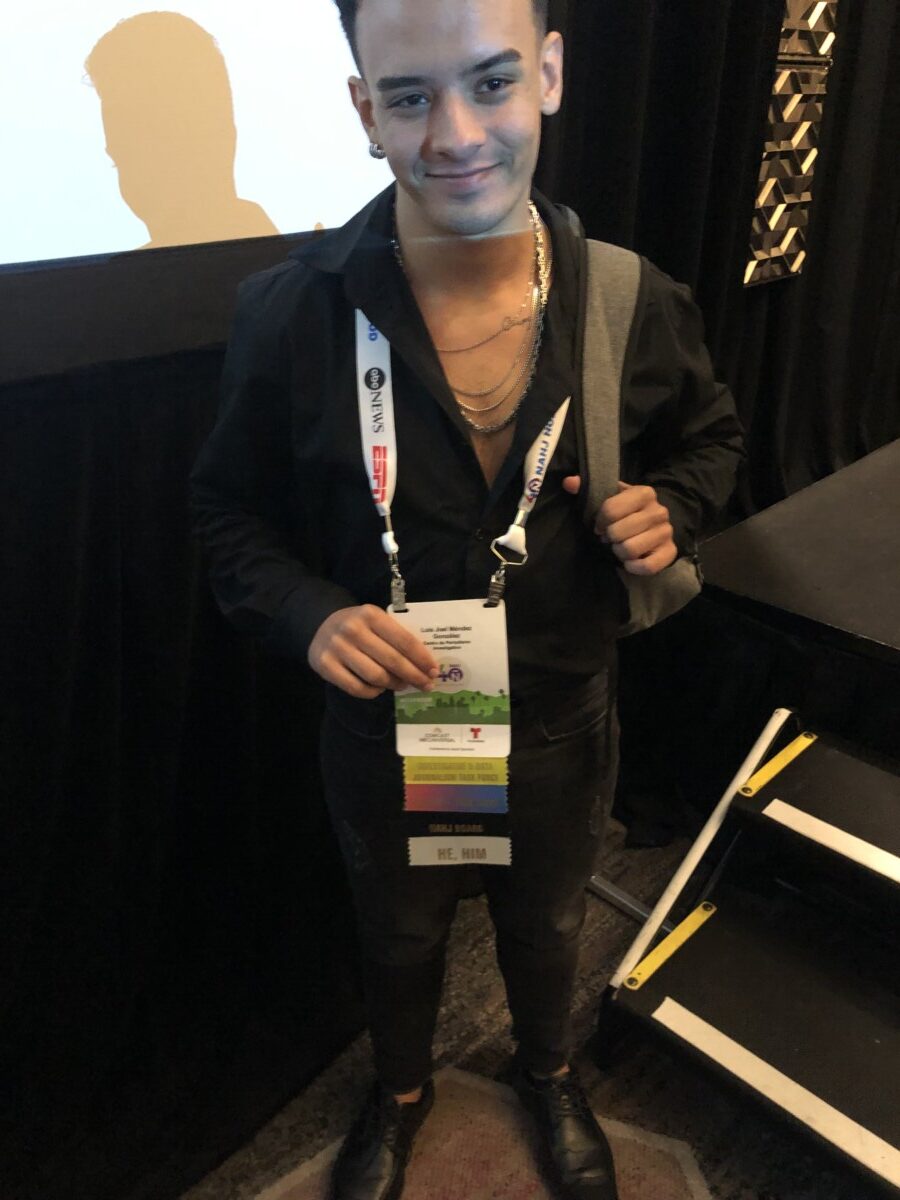 In another development, NAHJ’s LGBTQIA+ Committee announced it was translating its guidebook from Spanish to English, and that the convention lanyards now have the option of stating the pronoun the wearer prefers. In photo, Luis Joel Méndez González, co-chair of the committee and member of the board of directors, is wearing a lanyard with the pronouns “his/him” at the bottom.
In another development, NAHJ’s LGBTQIA+ Committee announced it was translating its guidebook from Spanish to English, and that the convention lanyards now have the option of stating the pronoun the wearer prefers. In photo, Luis Joel Méndez González, co-chair of the committee and member of the board of directors, is wearing a lanyard with the pronouns “his/him” at the bottom.
The recently updated Associated Press Stylebook says, “As much as possible, AP now uses they/them/their as a way of accurately describing and representing a person who uses those pronouns for themself.” Some transgender people prefer to refer to themselves as “they.”
- Phil Lewis, What I’m Reading: CNN quietly disbands its Race and Equality team (July 11)
- Andrés I. Jové Rodríguez and Shawntay Lewis, Latino Reporter: Future collaborations with NABJ remain uncertain as NAHJ plans solo 2025 conference in Chicago
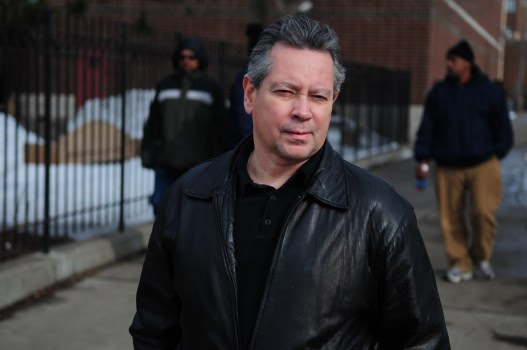
Pioneer Press columnist Rubén Rosario in St. Paul, Minn., in 2011. He spent five years as city editor and head of the public-safety team at the Pioneer Press, became a featured columnist in 1997 and wrote more than 2,000 columns. (Credit: Ben Garvin/Pioneer Press)
Rubén Rosario, ‘OG Street Reporter,’ Dies at 70
How many ways can you describe such a colorful character as Rubén Rosario?
“When a legend falls in the journalism world, you can be sure of one thing: The stories will flow,” Laura Yuen wrote Thursday in the Star Tribune of Minneapolis.
“Longtime St. Paul Pioneer Press metro columnist Rubén Rosario had stories in spades. He covered crack dens in New York, exposed police scandals in the Twin Cities, and interviewed everyone from prostituted women to families of murder victims.
“And those of us lucky to have ever been in his orbit all have stories about Rosario. He died Wednesday at age 70 from complications associated with his decade-plus battle with multiple myeloma. . . .”
In the newspaper that defined him as a columnist, the Pioneer Press, Mary Divine began, “You can take the boy out of the Bronx, but you can never take the Bronx out of the boy.
“Former St. Paul Pioneer Press columnist Rubén Rosario, a tireless advocate for the powerless, grew up in the Bronx and earned his journalism stripes working at the New York Daily News.
“Rosario – who moved to Minnesota in 1991 and worked at the Pioneer Press for almost 30 years – died Wednesday morning at the M Health Fairview University of Minnesota Medical Center in Minneapolis, from complications related to multiple myeloma. He was 70.
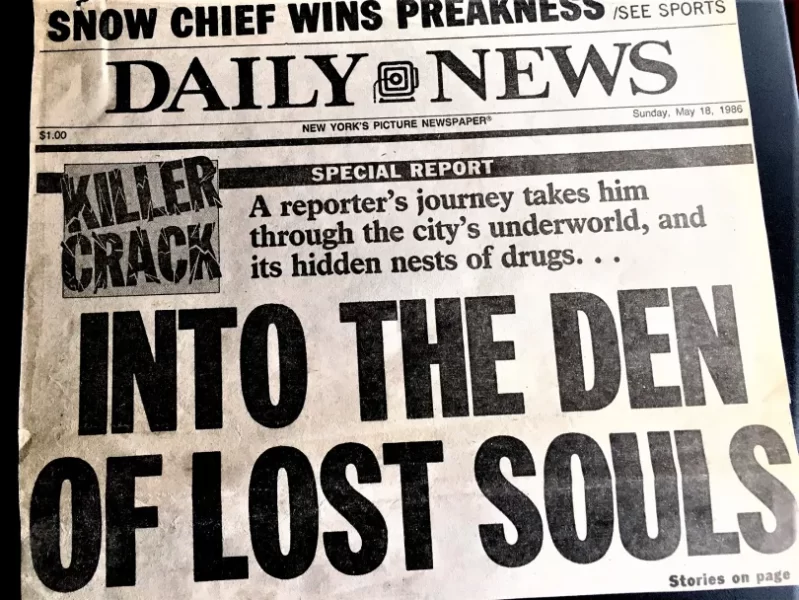
“There was the time I went undercover inside a drug den, smoked crack and wrote a front-page, first-person account of a drug that was then devastating Harlem and other poor, inner-city neighborhoods during the mid-1980s,” Ruben Rosario wrote. He also told readers, “The last thing I wanted to do as a columnist was sit behind a desk and pen easy cheap shots or witty pontifications. Some do this well. But it’s not in me.”
“Rosario, of Rosemount, was ‘a real journalist – a shoe-leather, go-to-the-scene, get-on-the-phone, ask-the-questions, check-it-out journalist,’ said Mike Burbach, the editor of the Pioneer Press and a longtime friend. ‘He had plenty of opinions, as a columnist should, but he was a journalist first.’
“Rosario specialized in writing about public-safety issues and covered some of the most notorious crime cases in New York City and Minnesota, including high-profile organized-crime trials, subway gunman Bernard Goetz, the Etan Patz disappearance, the Central Park jogger case and controversial police shootings. He once went undercover inside a drug den, smoked crack and wrote a front-page, first-person account of a drug that was then devastating Harlem and other poor, inner-city neighborhoods during the mid-1980s.
“ ‘His sense of justice came through in everything he did,’ said U.S. Attorney Andrew Luger, who got to know Rosario when he was an assistant U.S. attorney in Brooklyn in the late 1980s. ‘My rule was if Rubén wanted to interview me or talk to me, I always did it. I admired his hard-hitting, get-to-the-bottom-line approach. There were no frills and no nonsense. Every single interaction I had with him was rewarding.’ “
Divine also wrote, “Rosario dedicated countless volunteer hours to helping young journalists, working as the intern coordinator at the Pioneer Press and volunteering with the ThreeSixty journalism-mentoring program at the University of St. Thomas. One summer Pioneer Press intern said she learned more about reporting from overhearing him than she’d learned in any journalism class.”
The Latino Reporter, student newspaper of the National Association of Hispanic Journalists convention, headlined its story by Shawntay Lewis, “‘OG street reporter,’ long-time NAHJ member remembered for his love of dance, storytelling,” and said Rosario was “Known as the ‘OG street reporter’ to many.”
But not always as a “journalist.”
“I would never describe Rubén as a journalist or as a columnist. I would describe Rubén as a newspaper man. He was an old-school newspaper man,” said Tony Marcano, from Southern California Public Radio. “We’re going to miss him a lot.”
The story continued, “A Bronx native and Nuyorican, Rosario cared about the people he interviewed and knew his audience.
“ ‘In the 1970s and 80s, you didn’t see a lot of Latin names in New York’s newspapers, despite having a large Latin community. That’s kind of when I first spotted him,’ David Gonzalez, journalist from the New York Times, said. . . .”
Rosario wrote about his own priorities over the years, once about the need to have one’s affairs in order, referring readers to Tarp.org and honoringchoices.org, and another column when he retired from the Pioneer Press in 2020.
“There was the time in the early 1980s when then Daily News health reporter Heidi Evans and I posed as young lovebirds to expose an unethical abortion mill operation in Manhattan.
“Evans, pretending she might be pregnant, went to an exam room to have her urine tested. She came back to the waiting room. A few minutes later, someone came out to inform us that she was indeed with child. She placed her head on my shoulder at hearing the news. We told the staff we would think it over and left. One problem — it was my vial of urine she covertly had tested.
“Rubén Rosario contributed to this story’ remains the best tagline of my career.”
Video of President Biden’s news conference. (Credit: CNN/YouTube)
Biden Takes No Questions From Black Journalists
President Biden did not call on any Black journalists in his highly anticipated news conference Thursday after the NATO summit in Washington, according to longtime White House reporter April D. Ryan, now of the Grio.
While Biden has been reaching out to Black reporters in Black venues, “There are Black reporters covering all aspects of life,” and those in mainstream media should be called on as well, Ryan told Journal-isms Friday.
The news conference was Biden’s first in eight months, and was “designed to demonstrate that Mr. Biden remains capable of the nimbleness and stamina required to continue his campaign against former President Donald J. Trump,” Michael D. Shear wrote for The New York Times. Biden took questions from 11 reporters.
“In the end, it appeared to do little to change the discussion roiling the country and his party, with some allies leaping to his defense and others calling for him to step aside for someone else.”
However, Stacy M. Brown, senior national correspondent of the National Newspaper Publishers Association, representing Black-press publishers, responded to the question about Black presence from a different perspective.
Brown messaged Journal-isms, “We were well represented last night at the press conference as well as throughout NATO and quite frankly throughout the campaign the Biden-Harris administration has gone above and beyond to ensure access. Further, the NNPA now has three journalists with White House hard passes and several more with Senate Gallery credentials. For those who follow our newspapers and websites, they have no question that NNPA is well represented in political coverage.”
Brown had written for NNPA in June, “The National Newspaper Publishers Association, or NNPA, concluded its 2024 annual summer convention on Saturday leaving its mark on Baltimore and making history as the first trade association with a presidential campaign as an event sponsor. The Biden-Harris campaign also announced a groundbreaking 7-figure advertising and sponsorship deal with the NNPA, which represents 250 Black-owned newspapers and media companies comprising the Black Press of America.”
Biden has scheduled a primetime interview with NBC’s Lester Holt, who is African American, in Texas on Monday, Alex Weprin reported Wednesday for the Hollywood Reporter.
“NBC says that it will run the interview ‘in its entirety’ as a primetime special Monday night at 9 p.m. It will also stream on the NBC News Now streaming service at that time, with some clips premiering on Monday’s NBC Nightly News, which Holt anchors.
“NBC will also release an unedited transcript after the interview.”
Ed Gordon is to sit down with Biden on Tuesday to air Wednesday evening on BET.
- Associated Press: Vice President Kamala Harris leads new campaign effort to reach out to Asian American voters
- Ashleigh Fields, National Newspaper Publishers Association: Biden Shows Reporters He Won’t Step Aside: ‘It’s Not Gonna Happen’
- Linley Sanders, Associated Press: Trump wants Black and Latino support. But he’s not popular with either group, poll analysis shows
- Marianna Sotomayor, Leigh Ann Caldwell, Jacqueline Alemany and Theodoric Meyer, Washington Post: Black Democrats are emblematic of a House torn over Biden
Another Top Woman of Color Steps Aside
July 12, 2024
Ciprián-Matthews Exits as CBS News President
NAHJ Charges for Covering Whole Convention:
Event Is Money-Making Venture, Leader Says
Latino Voters Both Targeted, Ignored, Panelists Say
Thompson to Help Build WaPo’s ‘Third Newsroom’
Short Takes: CNN job cuts; Vic Carter; federal government ad contracts; settlement in raid on Marion County (Kan.) Record; effect of abortion ban on Black women; Christopher Franklin; capitalizing “B” in Black upsets some; new IRE officers; false reporting on Michael Jordan’s ex-wife; impact of overdose deaths on Black children; Eric Deggans and ‘The Bachelor’; Latin America’s most famous journalism film; Kenyan police culpability in Pakistani journalist’s death; underreported refugee and migrant deaths in Africa; continuing conflict-related sexual violence in South Sudan; AllAfrica.com.
‘Press Freedom in Black-Run Countries’ Set Aug. 1
Homepage photo: Ingrid Ciprián-Matthews, president of CBS News, pays tribute to journalists who have been killed and those still in harm’s way during her First Amendment Award acceptance speech in March in Washington, D.C. (Credit: Radio Television Digital News Association)
Support Journal-ismsNew! Facebook fundraiser for Journal-isms Inc.
Donations are tax-deductible.
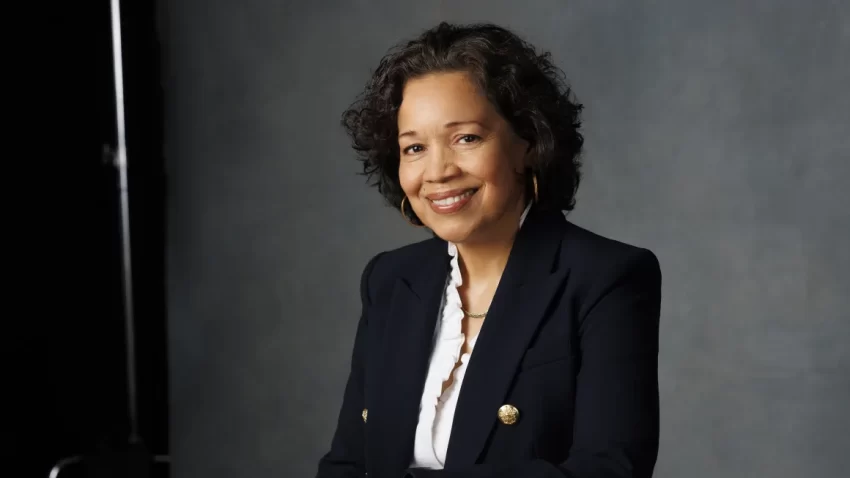
“No journalist wants to ‘be’ the news, especially me,” said Ingrid Ciprián-Matthews (Credit: CBS News) .
Ciprián-Matthews Exits as CBS News President
Ingrid Ciprián-Matthews, a three-decade veteran of CBS News who was born in the Dominican Republic, abruptly announced Wednesday that she will step down from her role of CBS News president as the news organization’s parent company prepares for a complex merger.
Her departure reduces by one the number of top mainstream television news executives of color, following the departure of Kim Godwin in May as president of ABC News and Neeraj Khemlani as president and co-head of CBS News and Stations, preceding Ciprian-Matthews in the job. Khemlani was born in Singapore with Indian ancestry; Godwin is African American.
Remaining are George Cheeks, CBS president/CEO and one-third of the recently formed “Office of the CEO,” who is biracial; and Rashida Jones, president of MSNBC, who is African American.
“No journalist wants to ‘be’ the news, especially me. But today, I have some news of my own to share,” Ciprián-Matthews announced in a memo to employees. “After much consideration, I’ve decided this is the right time to step away from my current role at CBS News and begin to write my next chapter.
“We all know our industry and company are going through a transformation and a number of short- and long-term decisions need to be made,” she wrote. “I do not want to be disingenuous with any of you about who should drive those decisions. I’ve always leaned into my integrity and my values and I felt it was important to be transparent at this juncture about my plans.”
” ‘Wendy McMahon, chief executive of CBS News and Stations, said in a separate memo to staffers that Ciprián-Matthews will move into a newly created role as senior editorial adviser helping to guide the outlet’s politics coverage during the election,” Oliver Darcy reported for CNN.
“The announcement also comes days after Paramount Global, the parent company of CBS News, accepted an offer from Hollywood production studio Skydance Media that will see the two companies merge. Following the merger, Skydance Media plans to install its own leadership team.”
Ciprian-Matthews has been the subject of New York Post stories reporting from “sources” that she had “been accused of using her clout to promote minorities while unfairly sidelining white journalists at CBS, leading to several employee complaints and a major internal probe in 2021,” with one January headline calling her “woke.”
However, McMahon, Ciprian-Matthews’ supervisor, said in a statement to the Post then, “Any claims of discriminatory behavior are simply false. Like so many others at CBS News, I not only enjoy working with Ingrid but I am inspired by her care for her colleagues and the culture of CBS News.”
Deadline published memos Wednesday from Ciprian-Matthews and McMahon.
- Winston Cho, Hollywood Reporter: CBS Sued by Former Anchor Jeff Vaughn Over Alleged Racial Quotas (July 3)
NAHJ Charges for Covering Whole Convention
Event Is Money-Making Venture, Leader Says
Support Journal-ismsDonations are tax-deductible.
NBCUniversal delivers a 40th Anniversary Video Message for the National Association of Hispanic Journalists. (Credit: YouTube)
Event Is Money-Making Venture, Leader Says
The National Association of Hispanic Journalists, meeting in Hollywood, Calif., for its 40th anniversary, is now charging reporters who want to cover its convention for more than one day, breaking with the practice at most advocacy media organizations eager to get their message out.
[In a terse email Wednesday responding to an inquiry, the Asian American Journalists Association announced a similar policy — “We provide a one day complimentary pass to approved press. Those who wish to attend for more than one day must register as a regular attendee”. It did not elaborate.]
In defending NAHJ’s decision, outgoing president Yvette Cabrera said, among other rationales, “This is a conference that is a money-making [venture] for NAHJ.”
For journalists who are not NAHJ members, on-site registration for the five-day meeting is $599, plus an additional $80 or $125 for attending additional newsmaking events such as awards dinners.
 The NAHJ conference, which attracted about 1,600 registered attendees, including about 382 recruiters, according to Executive Director Yaneth Guillén-Díaz, is also preparing to elect a new board of directors. Dunia Elvir (pictured), a news anchor at Telemundo 52 in Universal City, Calif., is running unopposed for president. No offices are contested, but bylaws changes are on the ballot. Guillén-Díaz said NAHJ collected $300,000 in registration fees.
The NAHJ conference, which attracted about 1,600 registered attendees, including about 382 recruiters, according to Executive Director Yaneth Guillén-Díaz, is also preparing to elect a new board of directors. Dunia Elvir (pictured), a news anchor at Telemundo 52 in Universal City, Calif., is running unopposed for president. No offices are contested, but bylaws changes are on the ballot. Guillén-Díaz said NAHJ collected $300,000 in registration fees.
Elvir is Los Angeles chapter president and national Spanish at-large officer. Part of her candidate’s statement says, “As a member of the L.A. chapter, we achieved strategies to present issues regarding more visibility and equality in our newsrooms, we created a series of panels that offer tools for bilingual journalists, attacking all fronts to better support them, including Spanish speakers. As a strong collective, we can achieve this by working together.”
NAHJ spokesperson Andrew Sherry, who performs a similar function for AAJA, was asked for an official explanation of the press-coverage policy. He said, “The policy existed last year but was not consistently enforced; this year NAHJ management asked for it to be consistent. Most NAHJ conference attendees are journalists attending in a professional capacity and their registration fees support the organization.”
4 Questioned at a board meeting Tuesday as the convention opened, Cabrera (pictured) modified the new policy by saying that reporters could attend public events on days other than the one for which they have permission, such as a “town hall” Tuesday evening, a membership meeting and a board meeting. Workshops where issues are discussed (scroll down) are still off-limits without registration.
Questioned at a board meeting Tuesday as the convention opened, Cabrera (pictured) modified the new policy by saying that reporters could attend public events on days other than the one for which they have permission, such as a “town hall” Tuesday evening, a membership meeting and a board meeting. Workshops where issues are discussed (scroll down) are still off-limits without registration.
Other board members asserted that requiring reporters to pay registration fees was “standard,” asked that it be noted that student journalists were covering the convention, though none were at the Tuesday board meeting, and that any journalist attending could claim to be covering the event.
Outside of NAHJ, those queried by Journal-isms differed. “This will only hurt journalists from small pubs,” messaged Robin Blinder, editor of Editor & Publisher magazine. “I say this because journalists from larger pubs will be more likely to have [budgeted] $$ to spend on conferences, travel, etc. Journalists from smaller pubs and solo journalists don’t have the financial backing and may have to pay out-of-pocket.”
A former journalist messaged, “When I was at [a nonprofit membership association], we didn’t charge journalists for covering our annual conferences. It wasn’t an extra cost to us to have a few dozen extra bodies in the facilities among the 4k attendees. I believe we did charge them for meals at awards dinners/luncheons serving meals. They were free to decline a meal and would not be charged.
“I recall one year [one part of the organization] tried to charge journalists for its popular annual meeting because the section claimed some attendees were trying to ‘sneak’ in for free with journalist’s credentials. The . . . Media Relations department fought it, and the section caved and continued admitting journalists for free – though it placed a limit on the number of journalists per media outlet.”
NAHJ staged a special virtual candidates forum on June 26. (Credit: YouTube)
Dan Shelley, president and CEO of the Radio Television Digital News Association, messaged, “While RTDNA comps working journalists wishing to cover our events, we have no comment on any other association’s policies regarding press coverage. Each organization should make its own decisions consistent with what it believes is appropriate.”
At the Indigenous Journalists Association, Executive Director Rebecca Landsberry said, “The large majority of our members are working journalists so there’s always a benefit to attending as a paid participant, but for those there to independently report on the event, IJA is happy to offer media credentials and grant access to workshops, sessions and special events at no cost.”
The National Association of Black Journalists’ statement on press credentials is relatively detailed, but addresses the contention that all journalists attending are in truth media reporters. It says, “Credentials do not replace convention registration and do not grant access to attendee benefits, meal functions, or services. All credential holders are expected to provide active coverage during the event.”
The Asian American Journalists Association, like NABJ, is not believed to have charged working journalists for covering its conventions.
That is also true internationally.
Scott Griffen, who heads the International Press Institute, a press-freedom group based in Vienna, Austria, messaged, “We don’t have this written down in stone anywhere, but our practice is that we do not charge journalists who want to cover our Congress a registration fee. We give them a free press pass.
“However, I would say that in most cases, we usually indicate in our media advisories a handful of main sessions where we invite journalists to cover. So I think it really depends on the purpose. If the journalist is coming to cover a specific session or part of the Congress, we’ll give them a free press pass. But if they are actually coming to attend as participants, then we would charge a registration fee.
“But this is just our general practice, as I said we don’t have a policy written down on this.”
One exception: the Online News Association said it has required working journalists to pay up. “Since the ONA conference is an event for journalists, we do not offer press passes,” Karolle Rabarison, ONA’s director of communications, said, “We’ve provided complimentary registration through volunteering and fellowships for people who want to get involved and to expand access to the training, networking, and other professional development resources we deliver through the event.”
If revenue and spreading the message of advocacy were the purposes, the Los Angeles Times, largest newspaper in the area, is providing neither. “The LA Times does not cover the NAHJ convention,” said spokesperson Hillary Manning. Nor were other mainstream news organizations — or even niche ones — in evidence at the board’s meeting.
NAHJ’s 40th anniversary celebration was to have been at a joint convention with NABJ in Chicago, but NAHJ pulled out last year, saying it wanted to celebrate on its own.
Asked in April whether NABJ had been made whole after NAHJ eventually agreed to convene at the Chicago Hilton in 2025 — NABJ Executive Director Drew Berry had said “We will not be left holding the bag” — Berry said, “When we have something to say about that, we will. There’s nothing we have to say about that at this point.”
- National Association of Hispanic Journalists: NAHJ launches #MoreLatinosInNews campaign to celebrate 40th anniversary
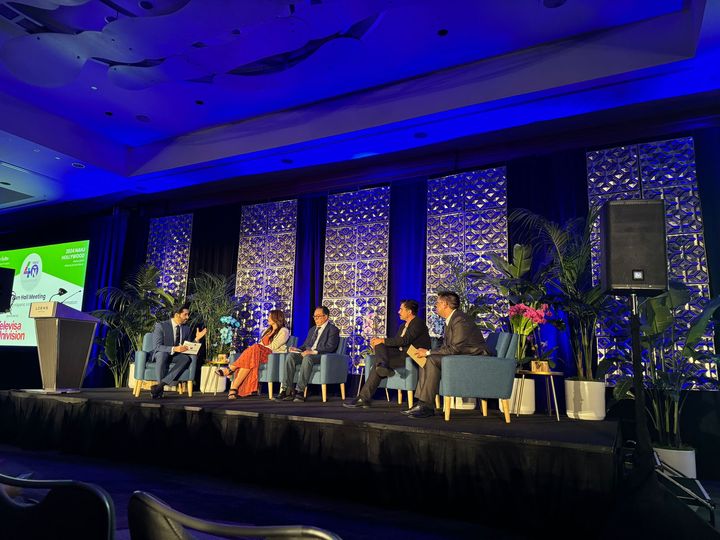
From left, moderator Elian Ziban of Univision; Factchequeado co-founder Laura Zommer; Alfredo Corchado of the Puente News Collaborative; Juan Espinoza of UnidosUS and Christian Arana of the Latino Community Foundation. (Credit: X)
Latino Voters Both Targeted, Ignored, Panelists Say
Latino voters, whose targeting for election disinformation and misinformation has been reported in numerous news stories, are also underestimated by political campaigns, find themselves the target of so-called “pink slime” fake-news operations and are not taken seriously enough by the Justice Department, which is charged with protecting Spanish-language speakers as well as others under the Voting Rights Act.
Those were assertions from panelists at a “town hall” Tuesday at the 2024 National Association of Hispanic Journalists convention.
The discussion at Loew’s Hollywood hotel, site of the conference, attracted perhaps 300 attendees, overwhelmingly conference participants.
Jean Guerrero, a former Los Angeles Times columnist, wrote last week in The New York Times, “In a November poll by Tufts University’s Center for Information and Research on Civic Learning and Engagement, only 51 percent of Latinos ages 18 to 34 said they were ‘extremely likely’ to vote in the 2024 election, compared with 62 percent of white youths. Fewer than one-fifth of surveyed youths said they’d heard from a political party or community organization in the past year.”
Guerrero’s piece was referenced by Christian Arana, vice president of civic power and policy at the Latino Community Foundation, which recently hired Julian Castro, former presidential candidate and secretary of housing and urban development in the Obama administration, as CEO.
At the foundation, Arana said, he fields questions such as, “If I turn in my ballot to a drop box, is it really going to count?”
Responses to such misinformation are “going to be a continuing thing” leading up to the November election, Arana said. As it has been.
Christine Fernando and Anita Snow reported in April for the Associated Press, “In addition to radio, much of the news and information Latinos consume is audio-based through podcasts or on social media platforms such as Facebook, WhatsApp and YouTube. Content moderation efforts in Spanish are limited on these platforms, which are seeing a rising number of right-wing influencers peddling election falsehoods and QAnon conspiracy theories.
“The types of misinformation overlap with falsehoods readily found in other conservative media and many corners of the internet — conspiracy theories about mail voting, dead people casting ballots, rigged voting machines and threats at polling sites.
“Other narratives are more closely tailored to Latino communities, including false information about immigration, inflation and abortion rights, often exploiting the traumas and fears of specific communities. For example, Spanish speakers who have immigrated from countries with recent histories of authoritarianism, socialism, high inflation and election fraud may be more vulnerable to misinformation about those topics.”
However, the AP reporters noted, “The Spanish-language fact-checking group Factchequeado is building partnerships with dozens of media outlets across the country to provide training and free Spanish fact-checking content.”
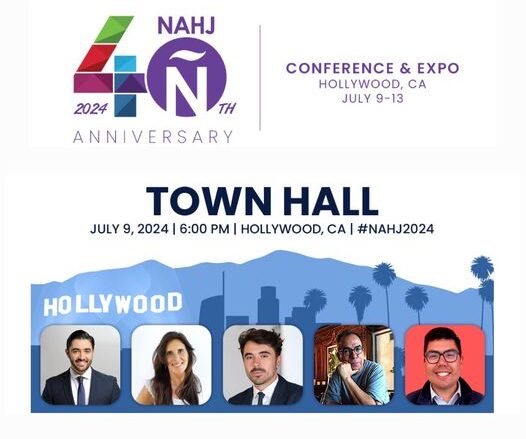
The “town hall” at Loew’s Hollywood hotel, site of the convention, attracted perhaps 300 attendees, overwhelmingly conference participants.
They quoted Factchequeado co-founder Laura Zommer, who was also on the NAHJ panel, titled, “Election 2024: Empowering Hispanic Voters as AI Amplifies Misinformation.”
” ‘Disinformation is at the same time a global phenomenon and a hyperlocal phenomenon,’ Zommer said. ‘So we have to address it with local and national groups uniting together. ‘ ”
Conversations about the 1965 Voting Rights Act, whose effectiveness has been narrowed by recent Supreme Court decisions, often overlook the act’s relevance to Spanish speakers.
“The language minority provisions of the Voting Rights Act require that when a covered state or political subdivision provides registration or voting notices, forms, instructions, assistance, or other materials or information relating to the electoral process, including ballots, it shall provide them in the language of the applicable minority group as well as in the English language,” the Justice Department states in a summary of the legislation.
But Juan Espinoza, senior civil rights adviser for UnidosUS, which describes itself as ” the nation’s largest Hispanic civil rights and advocacy organization,” maintained that “DOJ has had very few enforcement actions on the right to have information in our language.”
UnidosUS has called on Congress to pass three pieces of legislation on the subject: the Protect Elections from Deceptive AI Act, the AI Transparency in Elections Act, and the Preparing Election Administrators for AI Act.
“AI-generated deepfakes can further exacerbate existing misinformation targeting Latinos: turbocharging Spanish-language misinformation, expanding deceptive ads about what candidates are saying or doing, simulating voices of candidates in Spanish and other languages, geotargeting materially deceptive AI-generated content by country-of-origin or region, and even creating false portrayals of election interference and voting.
“Without proper safeguards, AI used to distort reality may be further weaponized to effectively deter Latino voters and undermine faith in our democratic systems,” it said.
[A Justice Department spokesperson responded Wednesday:
- [“The department is committed to using every tool at its disposal to safeguard voting rights.
- [“The department has filed lawsuits and secured consent decrees in New Jersey and Rhode Island regarding violations under Sections 203 and 208 of the Voting Rights Act related to Spanish language election materials and assistance at the polls.
- [“The department has conducted election monitoring nationwide to ensure compliance with federal voting rights law. Cities include Queens, NY; Union County, NJ; Prince George’s County, MD; Berks County, PA; Philadelphia County, PA; Milwaukee, WI; Providence County/Pawtucket, RI; Prince William County, VA.
- [“The department has issued new guidance on voting protections for language minority citizens in English and Spanish. The department also issued a Know Your Rights Guide, which now is available in 15 languages.”]
Alfredo Corchado, who took a buyout from the Dallas Morning News in January after covering U.S.-Mexico issues there for 31 years, now does the same kind of work with the Puente News Collaborative, bolstering journalism along the border. The area “has become like a piñata for politicians” and is “the largest news desert there is.”
Corchado noted the problem of “pink slime” news, a pejorative term first given to meat by-products used in some foods as low-quality filler. In journalism, it has meant far-right websites and fliers designed to look like newspapers.
In June, an Illinois judge ruled that the publishers of the so-called “pink slime” publications must remove registered voters’ full birthdates and street addresses from their websites, the Chicago Tribune reported.
“Pink slime is AI,” Corchado said. “In the end, truth is the best defense.”
Thompson to Help Build WaPo’s ‘Third Newsroom’
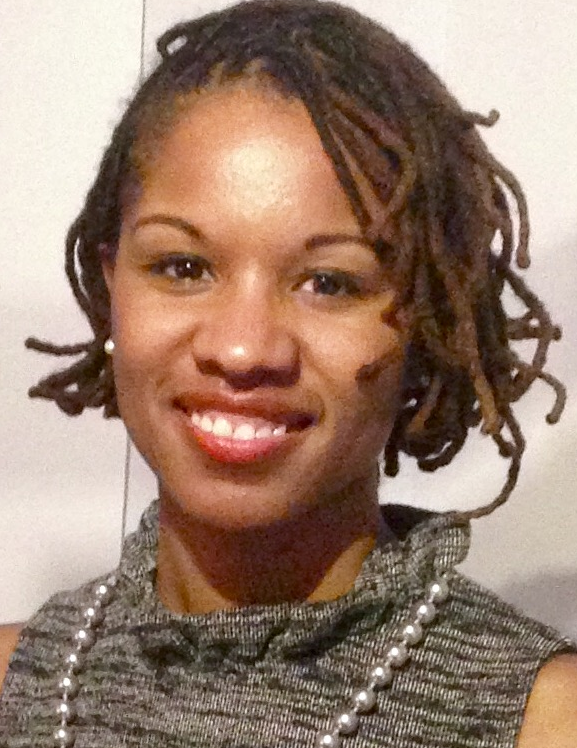 Krissah Thompson (pictured), managing editor for diversity and inclusion at The Washington Post, “will run the newsroom process building the third newsroom,” Matt Murray, interim executive editor at the Post, announced Monday.
Krissah Thompson (pictured), managing editor for diversity and inclusion at The Washington Post, “will run the newsroom process building the third newsroom,” Matt Murray, interim executive editor at the Post, announced Monday.
Murray has defined the “third newsroom” as “a way to think about innovation and new audiences and going off platform, and finding new ways to bring the Post to different kinds of readers and groups.” Under this “reinvention,” the opinion section is the “second newsroom.”
Thompson wrote Sunday on LinkedIn, “For the first time, The Washington Post had a presence on the multifaceted program at hashtag #essencefestival, the largest global gathering centered on Black culture. It was a great opportunity for two of our star journalists, Personal Finance Columnist Michelle Singletary and Senior Critic-at-Large Robin Givhan, to lend their expertise and for The Post to engage with new audiences. . . . The festival was also an exceptional reminder of the convening power of resonant media organizations.”
The New Orleans event closed Sunday with attendance at the Caesars Superdome at approximately 26,000 for Frankie Beverly and Maze, following the 45,000 or so who turned up for Usher on Saturday, Keith Spira reported Sunday for NOLA.com.
“Krissah, a two-decade-plus veteran of the Post, is uniquely qualified to shepherd us,” Murray said. “You all know her substantial leadership skills and the influence she has across the newsroom.”
Thompson added on LinkedIn, “I’m hoping to harness collective brainpower and creativity as we launch. Ideas welcome!”
Short Takes
- “CNN’s top leader announced 100 job cuts on Wednesday as well as a digital strategy that would include a new subscription-only digital offering by the end of the year,” John Koblin reported for The New York Times. “The company is laying off around 100 people, or about 3 percent of its work force. The layoffs would come ‘across the company,’ Mark Thompson, the network’s chairman, said in a memo to employees. CNN last had significant layoffs in late 2022. . . .”
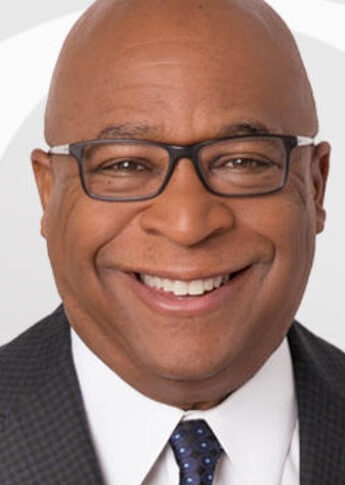 “Vic Carter (pictured), a fixture on WJZ-TV’s news broadcasts for nearly three decades, is leaving the station later this month to pursue other opportunities,” Christian Olaniran reported Monday for WJZ in Baltimore. “He said he will continue to try to make a difference in the lives of others, and ‘may even return to broadcasting in some form.’ ‘It’s time for me to focus on the future,’ Carter said. ‘I’ll cherish the great memories of my career, the places I’ve been, the people I’ve met, and the opportunities I’ve had.’ Vic Carter will officially leave WJZ on July 25. . . .”
“Vic Carter (pictured), a fixture on WJZ-TV’s news broadcasts for nearly three decades, is leaving the station later this month to pursue other opportunities,” Christian Olaniran reported Monday for WJZ in Baltimore. “He said he will continue to try to make a difference in the lives of others, and ‘may even return to broadcasting in some form.’ ‘It’s time for me to focus on the future,’ Carter said. ‘I’ll cherish the great memories of my career, the places I’ve been, the people I’ve met, and the opportunities I’ve had.’ Vic Carter will officially leave WJZ on July 25. . . .”
- “A new report released this month has revealed that the federal government spent $14.9 billion on advertising contracts over the last 10 fiscal years to inform the public about various programs and services,” Stacy M. Brown reported July 3 for the National Newspaper Publishers Association. “However, despite the government’s mandate to provide contract opportunities to businesses owned by minorities, women, and other socially or economically disadvantaged groups, significant disparities persist. The report found that contracts with those businesses represented about 14% of total federal advertising spending, amounting to $2.1 billion from fiscal years 2014 to 2023. . . .”
- “Almost one year after the authorities raided The Marion County Record, a Kansas weekly newspaper, a former reporter has reached a $235,000 settlement as part of a lawsuit she filed over the search, which set off a national discussion about press freedoms,” Emmett Lindner reported for The New York Times. “The settlement, dated June 25, brought an end to a lawsuit filed by the former reporter, Deb Gruver, against Gideon Cody, who resigned as the Marion city police chief in October in the face of mounting pressure. . . .”
- “It’s been more than two years since the Supreme Court ended the constitutional right to abortion, “PBS News Hour co-host Amna Nawaz reported July 2. “Since then, nearly two dozen states have banned or restricted access to the procedure and abortion pills. Special correspondent Sarah Varney traveled to Tennessee to report on the disproportionate impact abortion bans are having on Black women.”
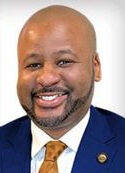 “Christopher Franklin (pictured) has been named president and general manager of WATN-WLMT Memphis, Tennessee, the Tegna-owned ABC-CW duopoly. He’s been interim general manager since earlier this year and starts in the official role immediately,” Michael Malone reported June 26 for Broadcasting & Cable.
“Christopher Franklin (pictured) has been named president and general manager of WATN-WLMT Memphis, Tennessee, the Tegna-owned ABC-CW duopoly. He’s been interim general manager since earlier this year and starts in the official role immediately,” Michael Malone reported June 26 for Broadcasting & Cable.
- “I hear from large numbers of people on both sides of our ever-widening political divide,” Chris Quinn, editor and vice president of content for cleveland.com/The Plain Dealer, wrote Saturday. “The use of white as a race descriptor remains lower case, and a lot of people who write to me don’t accept that. I’ve explained that white is not a descriptor of ethnicity, but for the people who object, they see nothing but unfairness in capitalizing Black but not white except to be discriminatory. That sentiment is widely held. . . .I get the same sentiment about the evolving use of pronouns, particularly the use of the word ‘they’ as a gender-neutral singular pronoun. . . . “
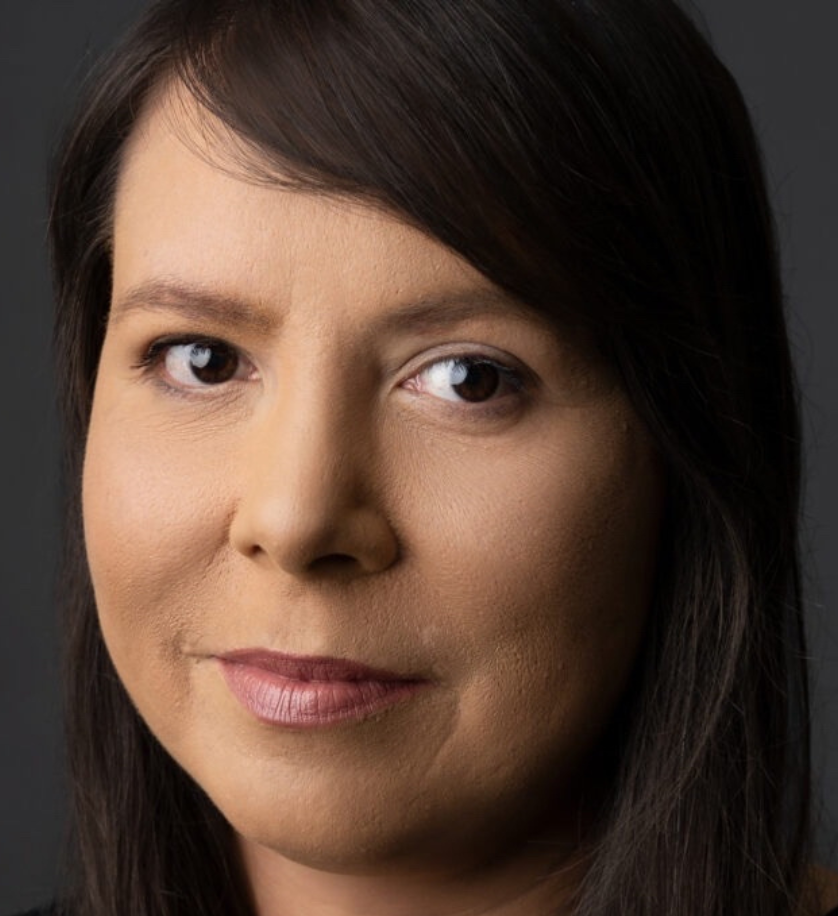 Investigative Reporters and Editors elected five new board members on June 27: Alejandra Cancino, investigative reporter based in Chicago; Mary Hudetz (pictured), ProPublica reporter based in Albuquerque, N.M.; Andrew Lehren, director of investigative reporting at City University of New York’s Graduate School of Journalism; Paroma Soni, data and graphics reporter at Politico; and Marina Villeneuve, legal reporter at Salon. Brian M. Rosenthal, investigative reporter at The New York Times, was reelected president.
Investigative Reporters and Editors elected five new board members on June 27: Alejandra Cancino, investigative reporter based in Chicago; Mary Hudetz (pictured), ProPublica reporter based in Albuquerque, N.M.; Andrew Lehren, director of investigative reporting at City University of New York’s Graduate School of Journalism; Paroma Soni, data and graphics reporter at Politico; and Marina Villeneuve, legal reporter at Salon. Brian M. Rosenthal, investigative reporter at The New York Times, was reelected president.
- “Amy Jacobson, co-host of Chicago’s ‘Morning Answer,’ is in some hot water over some false reporting,” J.R. Gamble reported July 1 for the Shadow League. ” Michael Jordan’s ex-wife Juanita Vanoy is extremely unhappy about Jacobson stating in a now-deleted post on X that Vanoy had been carjacked outside her home in Chicago by two black men and had some of her valuables ripped off as well. The 65-year-old made it clear that the story is totally fabricated by whomever the original source is. . . . “
- “A recent report by federal researchers provides the fullest picture yet of the sprawling impact of overdose deaths on Black children in Los Angeles and other cities — and what we can do about it,” Jerel Ezell wrote July 2 for the Los Angeles Times. “From 2011 to 2021, the report found, more than 321,000 American children lost a parent to a drug overdose. Black children experienced the highest increases in the rate of such losses during those years, compounding a long-standing public health crisis across Black America. Like much of the United States, Los Angeles has seen drug overdoses soar in recent years, with disproportionate losses among the city’s Black adults. . . .”
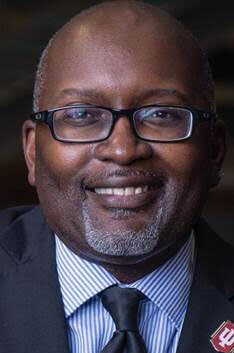 ” ‘The Bachelor’ producers acknowledge ‘vicious cycle’ of racism in the franchise,” read a headline over a June 26 story by Greg Braxton in the Los Angeles Times. “Why does it seem that ‘The Bachelor’ and ‘The Bachelorette’ have such a hard time dealing with racial issues in-depth?” asked National Public Radio‘s television critic Eric Deggans (pictured), referencing the fiery controversies surrounding the first two Black leads — Rachel Lindsay and Matt James — that culminated with both personalities bolting from the franchise. . . . It was ‘the silence that seemed to speak volumes,”’ Deggans later wrote. ‘… The show’s producers have never found a way to grapple with how white-centered the show is, how difficult that centering makes it for people of color who appear on the program and how that failure leaves them unable to respond well when problems involving racial issues arise. ‘ ”
” ‘The Bachelor’ producers acknowledge ‘vicious cycle’ of racism in the franchise,” read a headline over a June 26 story by Greg Braxton in the Los Angeles Times. “Why does it seem that ‘The Bachelor’ and ‘The Bachelorette’ have such a hard time dealing with racial issues in-depth?” asked National Public Radio‘s television critic Eric Deggans (pictured), referencing the fiery controversies surrounding the first two Black leads — Rachel Lindsay and Matt James — that culminated with both personalities bolting from the franchise. . . . It was ‘the silence that seemed to speak volumes,”’ Deggans later wrote. ‘… The show’s producers have never found a way to grapple with how white-centered the show is, how difficult that centering makes it for people of color who appear on the program and how that failure leaves them unable to respond well when problems involving racial issues arise. ‘ ”

- “The most famous films about journalism are from the U.S., repeating the dominance that Hollywood exercises over the global film industry,” André Duchiade reported July 1 for LatAm Journalism Review. “In the south of the continent, however, films are also made with journalism as a guiding thread, whether specifically about the journalistic craft or using reporters and editors as central elements of the plot. In a global ranking prepared by the project Periodistas en el Cine, only one Latin American film made it into the top 10: 2002 Brazilian movie ‘Cidade de Deus'(City of God), by Fernando Meirelles and Kátia Lund, which portrays the aspiring photo reporter Buscapé using images to carve out a path for himself in the midst of violence. . . .”
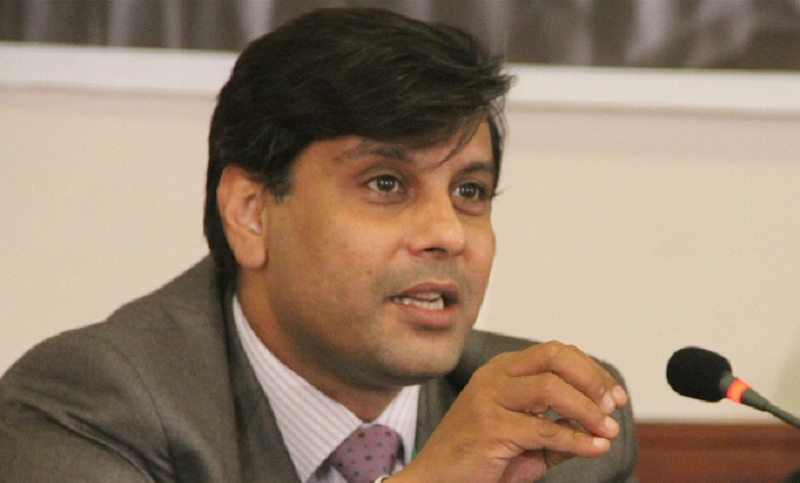 “The Committee to Protect Journalists said it “welcomes a Kenyan court’s Monday ruling that Kenyan authorities violated Pakistani journalist Arshad Sharif’s (pictured) right to life and that his death was arbitrary and unconstitutional. “Sharif was shot and killed by police on the night of October 23, 2022, in a remote area outside the Kenyan capital, Nairobi, in what police claimed was a case of mistaken identity. Sharif’s wife, Javeria Siddique, who sued the Kenyan government, believes her husband was targeted for his journalism. . . .” (Photo credit: Facebook)
“The Committee to Protect Journalists said it “welcomes a Kenyan court’s Monday ruling that Kenyan authorities violated Pakistani journalist Arshad Sharif’s (pictured) right to life and that his death was arbitrary and unconstitutional. “Sharif was shot and killed by police on the night of October 23, 2022, in a remote area outside the Kenyan capital, Nairobi, in what police claimed was a case of mistaken identity. Sharif’s wife, Javeria Siddique, who sued the Kenyan government, believes her husband was targeted for his journalism. . . .” (Photo credit: Facebook)
- “Refugees and migrants continue to face extreme forms of violence, exploitation and death on sea and on land across Africa as they move through the continent, UN agencies said on Friday, in an appeal to border authorities to do more to protect them,” the United Nations reported Friday. “Data from a new report by the Office of the UN High Commissioner for Refugees (UNHCR), the International Organization for Migration (IOM) and the Mixed Migration Centre (MMC) highlights the often under-reported perils facing vulnerable people on the move on dangerous land routes.”
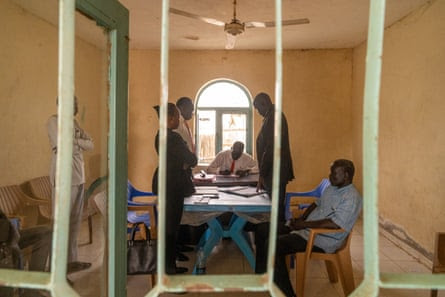
A mobile court in Mayom, Unity State, South Sudan, which recently recorded the first rape prosecutions since independence. (Credit: Peter Bateman/United Nations Mission in South Sudan)
- “Behind the UK-led commitments to end conflict-related sexual violence (CRSV), a Guardian investigation reveals that in reality South Sudan received little funding or support to catalyse change. High-profile perpetrators remain in public office.” Mark Townsend reported July 4 for the Guardian. Townsend also wrote, “In the past year armed groups have raped women, and children as young as six. At least one woman has died from her injuries. Tasked with tackling such depravity is a hotchpotch of community groups, committed but with little money. . . . ”
- “Two co-founders of AllAfrica Global Media — Dr. Tami Hultman and Reed Kramer — were honored with Lifetime Achievement Awards during the 2024 African Media Leaders Summit in Nairobi, Kenya in May,” Olubunmi Oloruntoba reported July 2 for AllAfrica.com. “The two were recognized for ‘exceptional contributions to media development in Africa’ along with other winners of Excellence Awards, including Dr. Akinwumi Adesina, president of the African Development Bank, veteran African media practitioners and young journalists from a number of countries. AllAfrica was launched in 2000 to provide visibility for news from and about Africa on the then-expanding internet. Spearheaded by co-founder Amadou Mahtar Ba, the organization forged relationships with news outlets across Africa, aggregating content from over 100 African media partners and national and international non-governmental organizations, and producing original reporting from Africa for an African and global audience. . . .”
‘Press Freedom in Black-Run Countries’ Set Aug. 1
Please click here for larger image of flier/poster
 The Journal-isms Roundtable will hold a panel discussion, “Press Freedom in Black-Run Countries,” in Chicago while the National Association of Black Journalists convention takes place in that city.
The Journal-isms Roundtable will hold a panel discussion, “Press Freedom in Black-Run Countries,” in Chicago while the National Association of Black Journalists convention takes place in that city.
The Roundtable will not officially be part of the convention; instead it will be hosted at the offices of Chicago Public Media on Thursday, Aug. 1, from 9 a.m. to 11 a.m. Central time. Chicago Public Media offices are on Navy Pier, at 848 East Grand Ave., Chicago, Ill., 60611.
The event is co-hosted by the NABJ Global Journalism Task Force. Those who are not in Chicago may join by Zoom. All are invited. To register for either in-person, Zoom or to watch on Facebook, please email blackruncountries (at) gmail.com.
After Black French journalist Olivier Dubois was held hostage last year for 711 days in Mali, West Africa, the press-freedom group Reporters Without Borders said, “To be a journalist in the Sahel means enduring the growing presence of radical armed groups who do not hesitate to kill reporters or kidnap them and use them as bargaining chips,” and more.
More recently, the rising authoritarianism around the world includes Africa as well as the United States. That most often means finding a way to tamp down, even silence, the press. Haiti’s existential crisis has been extensively reported, less so the state of journalism there and in the rest of the Caribbean.
Discussions about the African diaspora most often do not include press freedom, and journalism sessions in the U.S. about Black people often do not include a global view.
Panelists:
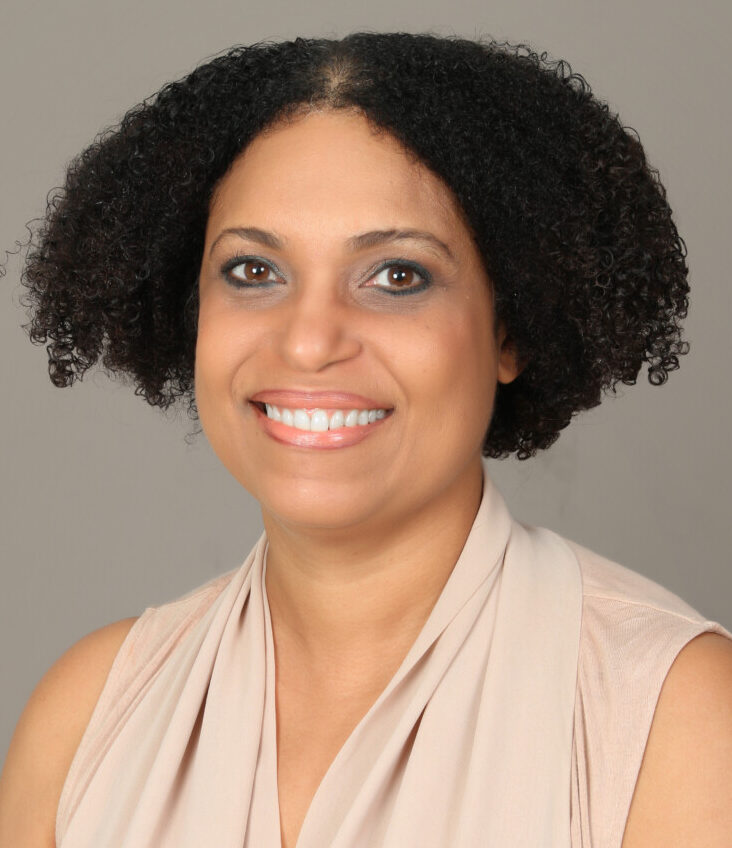 Zahra Burton, 18 Degrees North, Jamaica; Global Reporters for the Caribbean – founder and principal, Kingston, Jamaica
Zahra Burton, 18 Degrees North, Jamaica; Global Reporters for the Caribbean – founder and principal, Kingston, Jamaica
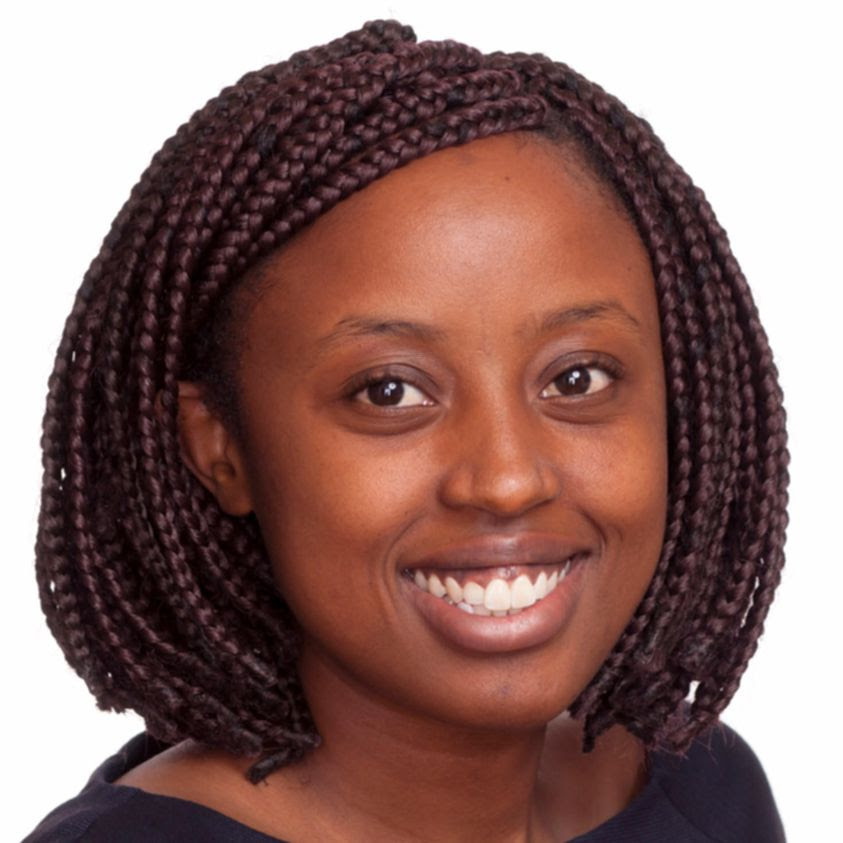 Muthoki Mumo, Committee to Protect Journalists – Africa program coordinator, based in Nairobi, Kenya
Muthoki Mumo, Committee to Protect Journalists – Africa program coordinator, based in Nairobi, Kenya
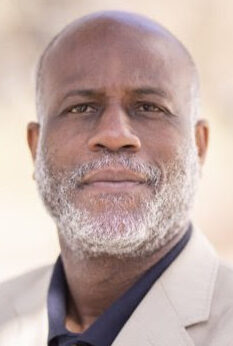 Garry Pierre-Pierre, Haitian Times – founder and publisher, Brooklyn, N.Y.
Garry Pierre-Pierre, Haitian Times – founder and publisher, Brooklyn, N.Y.
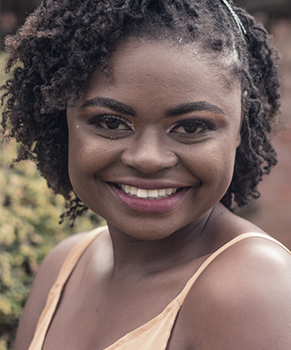 Nompilo Simanje, International Press Institute — Africa advocacy and partnerships lead, Bulawayo, Zimbabwe
Nompilo Simanje, International Press Institute — Africa advocacy and partnerships lead, Bulawayo, Zimbabwe
 John Yearwood, Politico – editorial director – diversity and culture; formerly global chair of the Vienna, Austria-based International Press Institute and world editor of the Miami Herald
John Yearwood, Politico – editorial director – diversity and culture; formerly global chair of the Vienna, Austria-based International Press Institute and world editor of the Miami Herald
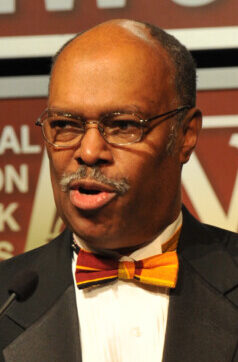 Richard Prince, Journal-isms columnist, moderator.
Richard Prince, Journal-isms columnist, moderator.
It’s not too early to RSVP to < blackruncountries (at) gmail.com > whether or not you will be at the NABJ convention.
Update:
(Credit: Wallace House/YouTube)
Exiled Haitian journalist, NABJ honoree, joining Roundtable
Roberson Alphonse, this year’s recipient of the Percy Qoboza Award from the National Association of Black Journalists, has agreed to join the special Journal-isms Roundtable Aug. 1 in Chicago on “Press Freedom in Black-Run Countries.”
“I’m honored by your invitation to join that panel,” Alphonse messaged. Commitment to “ringing the bell on press freedom, democracy in this era of disinformation, populism and the rise of authoritarian regimes is priceless. We have to deal with those issues while our profession is facing [an] existential crisis. We are in surviving mode in Haiti. It’s almost the same for local press here in the US.”
NABJ said, “This award recognizes a foreign journalist who has done extraordinary work while overcoming tremendous obstacles that contribute to the enrichment, understanding, or advancement of people or issues in the African Diaspora.
“Alphonse, one of Haiti’s most respected investigative journalists, is not only a fearless journalist but a brave soul. He survived a shooting attack in 2022 that left him wounded in both arms on his way to work at a Port-au-Prince radio station. Now a University of Michigan Knight-Wallace Fellow, he boldly continues to heal and continues his work as the News Editor for Le Nouvelliste and Information Director at Magik9.”
—
You can see a video detailing Alphonse’s story and journey to Wallace House here.
- Ajabu Adolphe, New Humanitarian: How Congolese journalists covering the M23 war are being forced to pick sides
- Committee to Protect Journalists: Three journalists disappear, 3 media outlets suspended in Burkina Faso
- Committee to Protect Journalists: Malian journalist Yeri Bocoum missing after covering banned protest (June 27)
- Global Press Journal: ‘Unwilling to Stop’: What it Takes to Be a Local Reporter in Haiti
- Mark Heywood, Daily Maverick, South Africa: The defence of journalism and journalists is a social justice issue (June 30)
- International Federation of Journalists: Kenya: Journalists attacked by police during protest in Nairobi
- Media Foundation for West Africa: Ghana’s ruling party’s thugs invade radio station, attack rival faction communicator (June 17)
- Media Foundation for West Africa: Liberia Stands at Crossroads: CEMESP [Center for Media Studies and Peacebuilding] issues call to action on World Press Freedom Day (May 6)
- Premium Times and Agency Report, Lagos, Nigeria: Nigerian govt threatens to jail whistleblowers who leak govt documents
- Radio Amazuj: Sudanese journalist released after detention in Shendi
- Reporters Without Borders: More than 70 obstacles to reporters’ work in three years: journalism at a crossroads in Senegal (June 6)
To subscribe at no cost, please send an email to journal-isms+subscribe@groups.io and say who you are.
Facebook users: “Like” “Richard Prince’s Journal-isms” on Facebook.
Follow Richard Prince on Twitter @princeeditor
Richard Prince’s Journal-isms originates from Washington. It began in print before most of us knew what the internet was, and it would like to be referred to as a “column.” Any views expressed in the column are those of the person or organization quoted and not those of any other entity. Send tips, comments and concerns to Richard Prince at journal-isms+owner@
View previous columns (after Feb. 13, 2016).
View previous columns (before Feb. 13, 2016)
- Diversity’s Greatest Hits, 2018 (Jan. 4, 2019)
- Book Notes: Is Taking a Knee Really All That? (Dec. 20, 2018)
- Book Notes: Challenging ’45’ and Proudly Telling the Story (Dec. 18, 2018)
- Book Notes: Get Down With the Legends! (Dec. 11, 2018)
- Journalist Richard Prince w/Joe Madison (Sirius XM, April 18, 2018) (podcast)
- Richard Prince (journalist) (Wikipedia entry)
- February 2018 Podcast: Richard “Dick” Prince on the need for newsroom diversity (Gabriel Greschler, Student Press Law Center, Feb. 26, 2018)
- An advocate for diversity in the media is still pressing for representation, (Courtland Milloy, Washington Post, Nov. 28, 2017)
- Morgan Global Journalism Review: Journal-isms Journeys On (Aug. 31, 2017)
- Journal-isms’ Richard Prince Wants Your Ideas (FishbowlDC, Feb. 26, 2016)
- Richard Prince with Charlayne Hunter-Gault, “PBS NewsHour,” “What stagnant diversity means for America’s newsrooms” (Dec. 15, 2015)
- Book Notes: Journalists Follow Their Passions
- Book Notes: Journalists Who Rocked Their World
- Book Notes: Hands Up! Read This!
- Book Notes: New Cosby Bio Looks Like a Best-Seller
- Journo-diversity advocate turns attention to Ezra Klein project (Erik Wemple, Washington Post, March 5, 2014)

